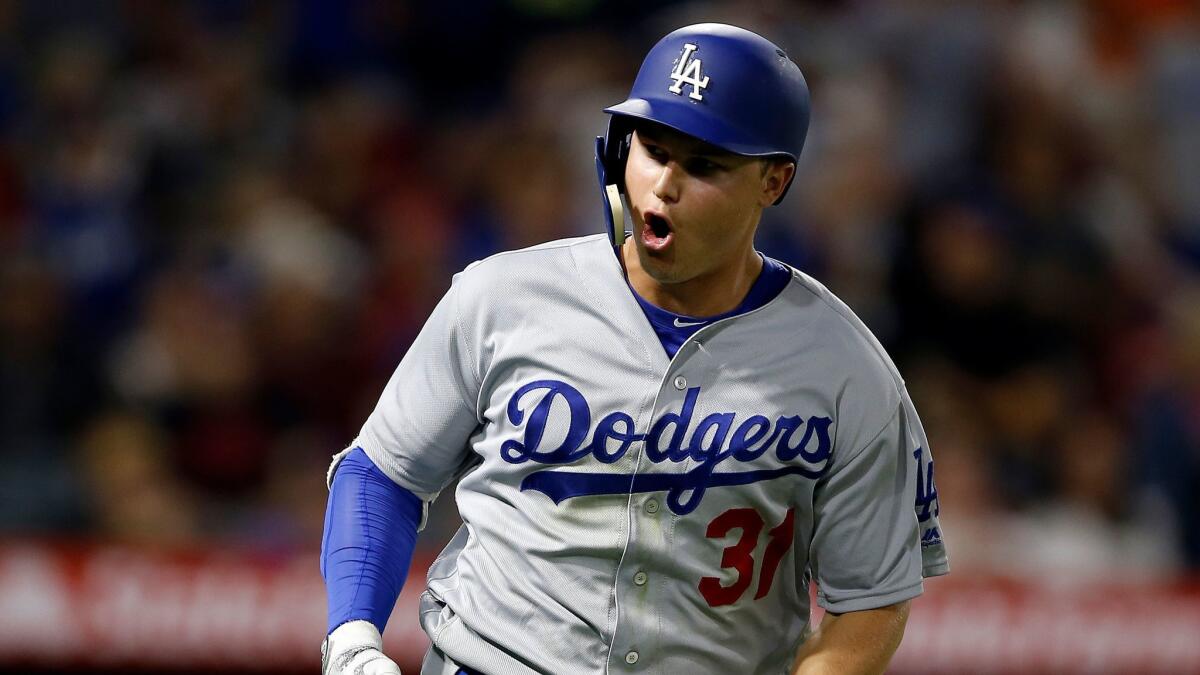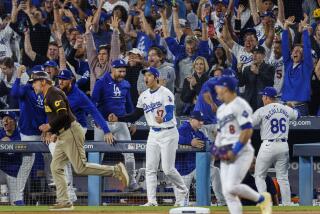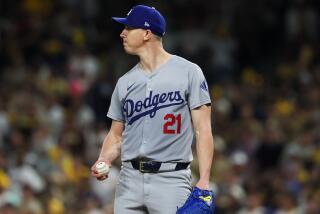Dodgers Dugout: Cody Bellinger, Joc Pederson and the myth of the Home Run Derby jinx

- Share via
Hi, and welcome to another edition of Dodgers Dugout. My name is Houston Mitchell, realizing my family has as many All-Star game starters this year as the Dodgers.
The Home Run Derby myth
A lot of Dodgers fans are nervous about Cody Bellinger taking part in this year’s All-Star Home Run Derby. Everyone remembers what happened to Joc Pederson after he took part in the 2015 derby. I even made a joke about it a couple of weeks ago. But is the belief that it ruined Pederson correct? Let’s take a look at the evidence.
Before the 2015 All-Star game, Pederson hit .230/.364/.487 with 20 homers and an OPS+ of 139. After the All-Star game he hit .178/.317/.300 with six homers and an OPS+ of 71. Problem solved, right? It was obviously the derby that did him in. But wait. Let’s take a closer look.
In his last 20 games before the 2015 All-Star game, Pederson hit .159/.266/.304, which is even worse than what he did after the All-Star game. So, Pederson’s slump started around mid-June, almost one month before the All-Star break even began.
How can we blame the Home Run Derby for something that was already happening? We can’t.
The entire Home Run Derby jinx is urban legend, with no facts to back it up. The biggest example most people use is Chris Davis, who hit 37 homers before the 2013 Home Run Derby and only 16 after. But do we really think Chris Davis was going to hit 70 homers that season? His overall numbers were still excellent after the break, so saying it jinxed him is quite a reach.
Davis is no different than Reggie Jackson in 1969. He had 37 homers at the break. After the break, he hit 11. If that happened now, everyone would be screaming that the Home Run Derby had ruined him (though it would have been great to see Reggie in a Home Run Derby).
In 1969, Frank Howard had 34 homers at the break. He hit 14 after. No Home Run Derby to mess up his swing.
Also keep in mind that most players are selected to compete in the derby because they are having a monstrous first half. Mike Trout, the best player in baseball for the last six seasons, has a career OPS+ of 172, making him the active leader. (OPS+ compares hitters to the league average. An average hitter will have an OPS+ of 100. Trout’s 172 means he is 72% better than the average hitter over the same time.) Only four active players have a career OPS+ of at least 150 and only 36 players in history (minimum 3,000 plate appearances) have a career OPS+ of at least 150.
But from 2012-2016, 17 of the 42 Home Run Derby competitors had an OPS+ over 150 at the time. There was no place for them to go but down and all but three did. Those three: David Wright in 2013 (from 151 to 154), Jose Bautista in 2014 (158-174) and Giancarlo Stanton in 2014 (163-182). The other 14 didn’t suffer from a jinx, they just regressed to their normal numbers.
Of the 42 Home Run Derby participants from 2012-16 (I’m not including two participants who were injured early in the second half and had limited playing time), only seven could have what could be considered a below-average second half, meaning an OPS+ below 100 after the break. Those seven: Mark Trumbo (162-74) in 2012, Carlos Gonzalez (180-99) in 2012, Pedro Alvarez (127-95) in 2013, Albert Pujols (137-91) in 2015, Joc Pederson (139-71) in 2015, Todd Frazier (155-80) in 2015 and Wil Myers (133-91) in 2016. And we’ve already talked about Pederson.
Among those players who have improved after the Home Run Derby: Corey Seager, who had an OPS+ of 135 before the 2016 break and 138 after.
Only one player has gone into the derby with an OPS+ of below 100, Yoenis Cespedes (97) in 2013. After the break his OPS+ was 114.
Some players get worse after the break, some get better and some stay the same. But now we have something to peg it to. Something we can blame it on. Because it is human nature to want to find something to blame. But we’ve picked the wrong thing.
Dodgers All-Stars
On Sunday, four Dodgers were named to the All-Star team: Cody Bellinger, Kenley Jansen, Clayton Kershaw and Corey Seager. Justin Turner is part of the final vote, with fans getting one more chance to vote him onto the team. Voting is available online at Dodgers.com/vote and MLB.com, as well as by mobile ballot and SMS text voting. Text “N5” to 89269 (USA) or 101010 (Canada) to vote for Turner. Voting by text message is limited to 35 per phone number. In addition, during the last six hours of voting (7 a.m.-1 p.m. PDT) on Thursday, tweets with #VoteJT will also count.
No Dodgers were elected as starters by fan vote, and Jansen blames Dodgers fans, saying: “I’ll say it loud and clear again. It’s the Dodger fans’ fault. Addison Russell got voted in [last year]. Corey Seager was way better. It’s the same thing this year, I feel like. J.T. deserved to be an All-Star for the last three years.”
I have only one thing to say about what Jansen said: He’s right. The Dodgers lead the NL in home attendance. If all those fans voted the maximum number of times, the Dodgers would have multiple starters.
The obscure Dodgers record of the week
Since the All-Star game began in 1933, which Dodgers have pitched the most career innings for the team without ever appearing in the game?
1. Doug Rau, 1,250 2/3
2. Ismael Valdez, 1,065
3. Tom Candiotti, 1,048
4. Luke Hamlin, 1,011
5. Joe Hatten, 961 1/3
6. Pedro Astacio, 886 2/3
7. Darren Dreifort, 872 2/3
8. Hugh Casey, 867 2/3
9. Roger Craig, 814
10. Tim Belcher, 806
And which Dodgers batters appeared in the most games without ever making the All-Star team?
1. Eric Karros, 1,601
2. Wes Parker, 1,288
3. Steve Yeager, 1,219
4. Willie Crawford, 989
5. James Loney, 896
6. Dave Hansen, 884
7. Billy Cox, 742
8. Dave Anderson, 713
9. Joe Ferguson, 699
10. Alex Cora, 684
All these numbers, and more, can be found at baseball-reference.com.
Next series
Tuesday, 6 p.m. PDT, Arizona (Patrick Corbin, 6-7, 4.76) at Dodgers (Clayton Kershaw, 12-2, 2.32)
Wednesday, 7 p.m. PDT, Arizona (Zack Godley, 3-2, 2.67) at Dodgers (Alex Wood, 9-0, 1.83)
Thursday, 7 p.m. PDT, Arizona (Zack Greinke, 10-4. 3.05) at Dodgers (Rich Hill, 5-4, 4.00)
Note: Pitchers are subject to change.
And finally
Dodgers have plenty of options as the trade deadline approaches. Read all about it here.
Have a comment or something you’d like to see in a future Dodgers newsletter? Email me and follow me on Twitter:@latimeshouston
Twitter: @latimeshouston
More to Read
Are you a true-blue fan?
Get our Dodgers Dugout newsletter for insights, news and much more.
You may occasionally receive promotional content from the Los Angeles Times.











